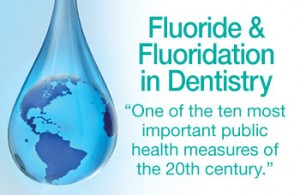How does fluoride protect teeth?
Is fluoride important for my child’s teeth even before they erupt, or break through the gums? Absolutely! Fluoride ingested in food, drinks or supplements strengthens the enamel so the tooth can better resist decay. Fluoride applied to the surface of teeth, with toothpaste or other dental products, can remineralize, or rebuild, weakened tooth enamel. Even after all teeth have grown in, ingested fluoride can benefit your teeth by being present in small amounts in saliva.
What is tooth enamel?
Tooth enamel is what we call the hard outer surface of teeth. It protects your teeth from decay but can be damaged by bacteria and acids that commonly form in your mouth from foods and drinks.
Should I add fluoride to my baby’s diet?
 Until they reach six months old, babies get all the nutrients and hydration they need from breast milk or formula. The Center for Disease Control promotes breastfeeding as ideal, but also recognizes there are many healthy choices for formula you can discuss with your doctor. Many baby formulas are now fortified with fluoride. Many municipalities also add fluoride to their water supplies, so the water you add to powdered baby formula could also contribute to the health of your baby’s teeth. Call your local water authority to find out the level of fluoride in your water. If you have well water, you can have your water tested, then speak with your baby’s dentist about getting a prescription for a fluoride supplement. The recommended dosage for children under three years of age is 0.25 milligrams per day. The CDC states the right amount of fluoride from infancy on helps prevent and control tooth decay throughout life.
Until they reach six months old, babies get all the nutrients and hydration they need from breast milk or formula. The Center for Disease Control promotes breastfeeding as ideal, but also recognizes there are many healthy choices for formula you can discuss with your doctor. Many baby formulas are now fortified with fluoride. Many municipalities also add fluoride to their water supplies, so the water you add to powdered baby formula could also contribute to the health of your baby’s teeth. Call your local water authority to find out the level of fluoride in your water. If you have well water, you can have your water tested, then speak with your baby’s dentist about getting a prescription for a fluoride supplement. The recommended dosage for children under three years of age is 0.25 milligrams per day. The CDC states the right amount of fluoride from infancy on helps prevent and control tooth decay throughout life.
Can too much fluoride be harmful?
Too much fluoride while the teeth are developing can cause a condition called dental fluorosis. Dental fluorosis causes brown or white spots to form on the teeth. They are usually faint or obvious depending on the amount of fluoride. If you always use fluoridated water to prepare a baby formula with fluoride, your baby could be at risk for developing dental fluorosis. If you are concerned, you can use low-fluoride bottled water, which will be labeled purified, distilled, de-ionized or demineralized. You may want to see your baby dentist to formulate a plan to reduce the risk of dental fluorosis.
How do I start a dental care regimen for my child?
It can be difficult to brush a baby’s or toddler’s teeth. Young children do not like to stay still, and prefer to swallow toothpaste rather than spit it out. As we mentioned in our baby dentist post, it is important before teeth erupt to run a soft, damp washcloth over your baby’s gums to cut down on the growth of bacteria. Another benefit is that being used to it will limit the possibility of them fighting the tooth-brushing process later on. As your baby’s teeth begin to erupt, use no more than a pea-sized smear of toothpaste on an infant toothbrush. As your child grows to understand the difference, by toddler age, you can work with them to teach them that toothpaste should be spit, not swallowed. You can make this fun! Another important part of starting your child’s oral care off right is by flossing their teeth as soon as they have two teeth to floss between.
If you are looking for a family or pediatric dentist please feel free to visit or contact us for an initial consultation. After experiencing our wonderful staff and dental care we feel very strongly that you will be coming back for years.
Call us for more information (617) 600-3442
or
